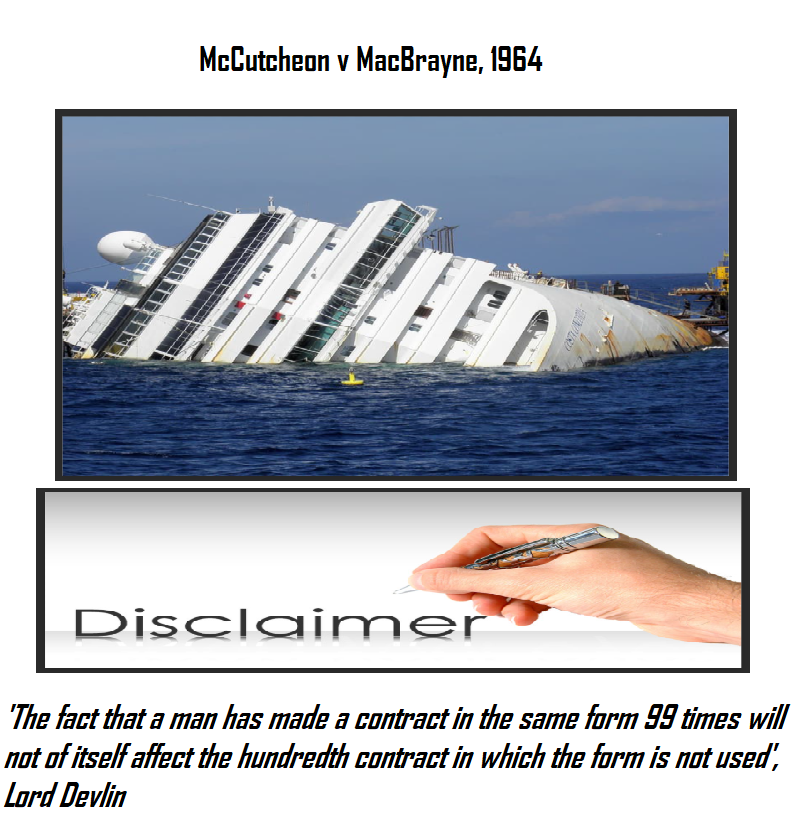McCutcheon v David MacBrayne Ltd [1964] 1 WLR 125
Citation:McCutcheon v David MacBrayne Ltd [1964] 1 WLR 125
Rule of thumb:Where someone is agreeing to a discharge of their legal rights, does this have to be agreed to every single time? Yes – common law rights have to be contracted out of every single time a new contractual relationship starts and are never contracted out of by custom and practice.
Background facts:
The facts of this case were that McCutcheon regularly used MacBrayne to transport his car from an island to the mainland, and sometimes his brother contacted MacBrayne to get the car transported. Sometimes McCutcheon or his brother would be asked to sign an acceptance of risk note, but sometimes not. The ship on this occasion sank and so did McCuthcheon’s car, but on this occasion McCutcheon’s brother had not signed a risk note before putting the car on the ship. McCutcheon sought damages from MacBrayne for the loss of his car on their ship. MacBrayne refused to pay this so the matter ended up in Court.
Parties argued:
MacBrayne argued that the risk note was incorporated as an implied term by regular practice. McCutcheon argued that exemptions from liability require writing every time under the contractual principle of form and it was not there - meaning that they did not have an exemption from liability.
Judgment:
The Court upheld the arguments of McCutcheon. The Court affirmed that the common law rights have to be contracted out of every single time and that they are never contracted out of by implication through regular practice. The Court held that McCutcheon was entitled to the damages for the loss of his car when the ship sunk.

Ratio-decidendi:
‘This is a matter that is relevant to the way in which the Respondents put their case. They say that the previous dealings between themselves and the Appellant, being always on the terms of their " risk note ", as they call their written conditions, the contract between themselves and the Appellant must be deemed to import the same conditions. In my opinion, the bare fact that there have been previous dealings between the parties does not assist the Respondents at all. The fact that a man has made a contract in the same form ninety-nine times (let alone three or four times which are here alleged) will not of itself affect the hundredth contract in which the form is not used. Previous dealings are relevant only if they prove knowledge of the terms, actual and not constructive, and assent to them. If a term is not expressed in a contract, there is only one other way in which it can come into it and that is by implication. No implication can be made against a party of a term which was unknown to him. If previous dealings show that a man knew of and agreed to a term on ninety-nine occasions, there is a basis for saying that it can be imported into the hundredth contract without an express statement. It may or may not be sufficient to justify the importation,—that depends on the circumstances; but at least by proving knowledge the essential beginning is made. Without knowledge there is nothing...’, Lord Devlin
'The fact that a man has made a contract in the same form 99 times will not of itself affect the hundredth contract in which the form is not used', Lord Devlin 19.
Warning: This is not professional legal advice. This is not professional legal education advice. Please obtain professional guidance before embarking on any legal course of action. This is just an interpretation of a Judgment by persons of legal insight & varying levels of legal specialism, experience & expertise. Please read the Judgment yourself and form your own interpretation of it with professional assistance.

